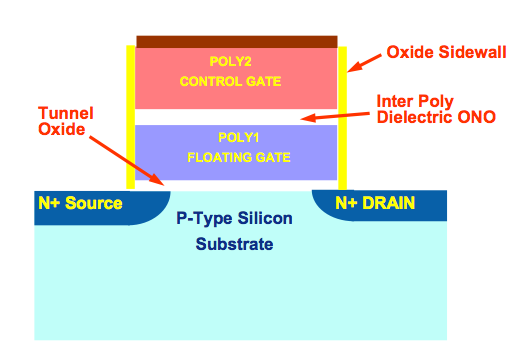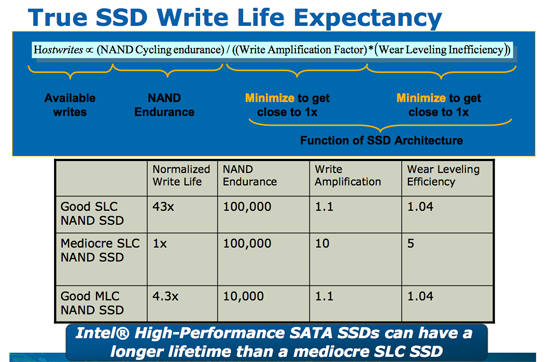The SSD Relapse: Understanding and Choosing the Best SSD
by Anand Lal Shimpi on August 30, 2009 12:00 AM EST- Posted in
- Storage
A Quick Flash Refresher
DRAM is very fast. Writes happen in nanoseconds as do CPU clock cycles, those two get along very well. The problem with DRAM is that it's volatile storage; if the charge stored in each DRAM cell isn't refreshed, it's lost. Pull the plug and whatever you stored in DRAM will eventually disappear (and unlike most other changes, eventually happens in fractions of a second).
Magnetic storage, on the other hand, is not very fast. It's faster than writing trillions of numbers down on paper, but compared to DRAM it plain sucks. For starters, magnetic disk storage is mechanical - things have to physically move to read and write. Now it's impressive how fast these things can move and how accurate and relatively reliable they are given their complexity, but to a CPU, they are slow.
The fastest consumer hard drives take 7 milliseconds to read data off of a platter. The fastest consumer CPUs can do something with that data in one hundred thousandth that time.
The only reason we put up with mechanical storage (HDDs) is because they are cheap, store tons of data and are non-volatile: the data is still there even when you turn em off.
NAND flash gives us the best of both worlds. They are effectively non-volatile (flash cells can lose their charge but after about a decade) and relatively fast (data accesses take microseconds, not milliseconds). Through electron tunneling a charge is inserted into an N-channel MOSFET. Once the charge is in there, it's there for good - no refreshing necessary.

N-Channel MOSFET. One per bit in a NAND flash chip.
One MOSFET is good for one bit. Group billions of these MOSFETs together, in silicon, and you've got a multi-gigabyte NAND flash chip.
The MOSFETs are organized into lines, and the lines into groups called pages. These days a page is usually 4KB in size. NAND flash can't be written to one bit at a time, it's written at the page level - so 4KB at a time. Once you write the data though, it's there for good. Erasing is a bit more complicated.
To coax the charge out of the MOSFETs requires a bit more effort and the way NAND flash works is that you can't discharge a single MOSFET, you have to erase in larger groups called blocks. NAND blocks are commonly 128 pages, that means if you want to re-write a page in flash you have to first erase it and all 127 adjacent pages first. And allow me to repeat myself: if you want to overwrite 4KB of data from a full block, you need to erase and re-write 512KB of data.
To make matters worse, every time you write to a flash page you reduce its lifespan. The JEDEC spec for MLC (multi-level cell) flash is 10,000 writes before the flash can start to fail.

Dealing with all of these issues requires that controllers get very crafty with how they manage writes. A good controller must split writes up among as many flash channels as possible, while avoiding writing to the same pages over and over again. It must also deal with the fact that some data is going to get frequently updated while others will remain stagnant for days, weeks, months or even years. It has to detect all of this and organize the drive in real time without knowing anything about how it is you're using your computer.
It's a tough job.
But not impossible.










295 Comments
View All Comments
Wwhat - Sunday, September 6, 2009 - link
If you read the first part of the article alone you would see how important a good controller is in a SSD and you would no ask his question probably, plus SSD's use the flash in parallel where a bunch of USB drives would not, the parallel thing is also mentioned in the article.And USB has a lot of overhead actually on the system, both in CPU cycles as well as in IO interrupts.
There are plug in PCI(e) cards to stick SD cards in though, to get a similar setup, but it's a bit of a hack and with the overhead and the management and controllers used and the price to buy many SD cards it's not competitive in the end and you are better of with a real SSD I'm told.
Transisto - Sunday, September 6, 2009 - link
You are right, the controller is very important.I think caching about 4-8 gig of most often accessed program files has the best price/performance ratio, for improving application load time. It it also very easily scalable.
One of the problem I see is integrating this ssd cache in the OS or before booting so it act where it matter the most.
I think there could be a near x25-m speedup from optimized caching and good controller no matter what SSD form factor it rely on. SD, CF, usb , pci or onboard.
Why it seams nobody talk about eboostr type of caching AND ,,, on other news ,,, Intel's Braidwood flash memory module could kill SSD market.
I am quite of a performance seeker.
But I don't think I need 80gig of SSD in my desktop,just some 8gb of good caching. Mabe a 60gb ssd on a laptop.
Well... I'm gonna pay for that controller once, not twice (160gb?)
Wwhat - Saturday, September 5, 2009 - link
Not that it's not a good article, although it does seem like 2 articles in one, but what I miss is getting to brass tacks regarding the filesystem used, and why there isn't a SSD-specific file system made, and what choices can be made during formatting in regards to blocksize, obviously if you select large blocks on filesystem level a would impact he performance of the garbage collection right? It actually seem the author never delved very deeply into filesystems from reading this.The thing is that even with large blocks on filesystem level the system might still use small segments for the actuall keepin track, and if it needs to write small bits to keep track of large blocks you'd still have issues, that's why I say a specific SSD filesystem migh be good, but only if there isn't a new form of SSD in the near future that makes the effort poinless, and if a filesystem for SSD was made then the firmware should not try to compensate for exising filesystem issues with SSD's.
I read that the SD people selected exFAT as filesystem for their next generation, and that also makes me wonder, is that just to do with licensing costs or is NTFS bad for flash based devices?
Point being at the filesystem needs to be highlighted more I think,
Bolas - Friday, September 4, 2009 - link
Would someone please hit Dell with the clue-board and convince them to offer the Intel SSD's in their Alienware systems? The Samsung SSD's are all that is stopping me from buying an Alienware laptop at the moment.EatTheMeat - Friday, September 4, 2009 - link
Congratulations on another fab masterclass. This is easily the best educational material on the internet regarding SSDs, and contrary to some comments, I think you've pitched your recommendations just right. I can also appreciate why you approached this article with some trepidation. Bravo.I have a RAID question for Anand (or anyone else who feels qualified :-))
I'm thinking of setting up 2 160GB x25-m G2 drives in RAID-0 for Win 7. I'd simply use the ICH10R controller for it. It's not so much to increase performance but rather to increase capacity and make sure each drive wears equally. After considering it further I'm wondering if SSD RAID is wise. First there's the eternal question of stripe size and write amplification. It makes sense to me to set the stripe size to be the same as, or a fraction of, the block size of the SSD. If you choose the wrong stripe size does it influence write amplification?
I'm aware that performance should increase with larger spripes, but I'm more concerned about what's healthy for the SSD.
Do you think I should just let SSD RAID wait until RAID drivers are optimised for SSDs?
I know you're planning a RAID article for SSDs - I for one look forward to it greatly. I've read all your other SSD articles like four times!
Bolas - Friday, September 4, 2009 - link
If SSD's in RAID lose the benefit of the TRIM command, then you're shooting yourself in the foot if you set them up in RAID. If you need more capacity, wait for the Intel 320GB SSD drives next year. Or better yet, use a 160 GB for your boot drive, then set up some traditional hard disk drives in RAID for your storage requirements.EatTheMeat - Friday, September 4, 2009 - link
Thanks for reply. I definitely hear you about the TRIM functionality as I doubt RAID drivers will pass this through before 2010. Still though, it doesn't look like the G2s drop much in performance with use anyway from Anand's graphs. With regard to waiting for 320 GB drives - I can't. These things are just too enticing, and you could always say that technology will be better / faster / cheaper next year. I've decided to take the plunge now as I'm fed up with an i7 965 booting and loading apps / games like a snail even from a RAID drive.I just don't want to bugger the SSDs up with loads of write amplification / fragmentation due to RAID-0. ie, is RAID-0 bad for the health of SSDs like defragmentation / prefetch is? I wonder if anyone knows the answer to this question yet.
jagreenm - Saturday, September 5, 2009 - link
What about just using Windows drive spanning for 2 160's?EatTheMeat - Saturday, September 5, 2009 - link
As far as I know drive spanning doesn't even the wear between the discs. It just fills up first one and then the other. That's important with SSDs because RAID can really help reduce drive wear by spreading all reads and writes across 2 drives. In fact, it should more than half drive wear as both drives will have large scratch portions. Not so with spanning as far as I know.Does anyone know if I'm talking sh1t here? :-)
pepito - Monday, November 16, 2009 - link
If you are not sure, then why do you assert such things?I don't know about Windows, but at least in Linux when using LVM2 or RAID0 the writes spread evenly against all block devices.
That means you get twice the speed and better drive wear.
I would like to think that microsoft's implementation works more or less the same way, as this is completely logical (but then again, its microsoft, so who can really know?).